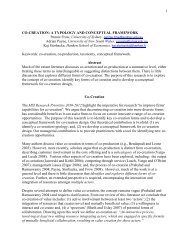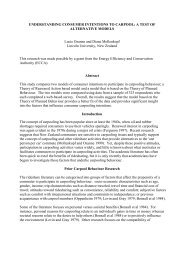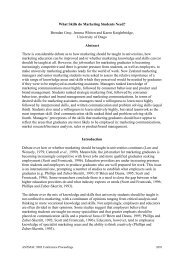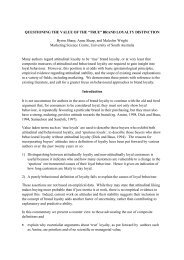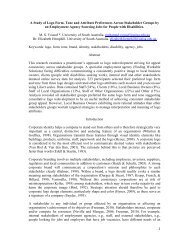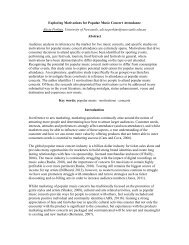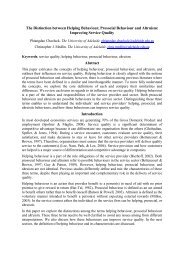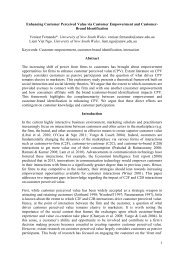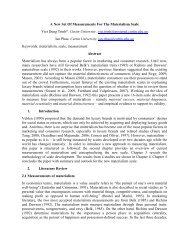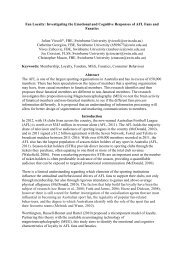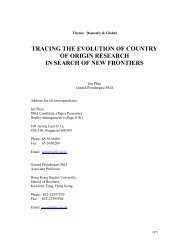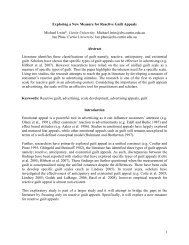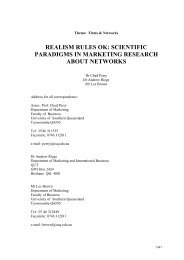The Chinese Concepts of Guanxi, Mianzi, Renqing and ... - ANZMAC
The Chinese Concepts of Guanxi, Mianzi, Renqing and ... - ANZMAC
The Chinese Concepts of Guanxi, Mianzi, Renqing and ... - ANZMAC
You also want an ePaper? Increase the reach of your titles
YUMPU automatically turns print PDFs into web optimized ePapers that Google loves.
References<br />
Ambler, T., Witzel, M., 2004. Doing Business in China. 2 nd Edition. London: Routledge.<br />
Bond, M.H. (Ed.), 1996. <strong>The</strong> H<strong>and</strong>book <strong>of</strong> <strong>Chinese</strong> Psychology. Hong Kong: Oxford<br />
University Press.<br />
Bond, M.H., Hwang, K.K., 1986. <strong>The</strong> Social Psychology <strong>of</strong> <strong>Chinese</strong> People. In Bond, M.H.<br />
(Ed.), <strong>The</strong> Psychology <strong>of</strong> the <strong>Chinese</strong> People. Hong Kong: Oxford University Press, 213-66.<br />
Chan, A.K.K., Deton, L.(T.), Tsang, A.S.L., 2003. <strong>The</strong> Art <strong>of</strong> Gift Giving in China. Business<br />
Horizons July-August, 47-52.<br />
Chang, H., Holt. G.R., 1991. More Than Relationship: <strong>Chinese</strong> Interpersonal Relationships.<br />
In Ting-Toomey, S., Korzenny, F., (Eds.), Cross-Cultural Interpersonal Communication.<br />
Newbury Park, CA: Sage, 28-57.<br />
Choi, S.C., Kim, K., 2004. Chemyeon – Social Face in Korean Culture. Korea Journal 44 (2,<br />
Summer), 30-51.<br />
Crombie, G., 2005. <strong>The</strong> Way <strong>of</strong> the Dragon: A Guide for Australians Doing Business in<br />
China. Milton, Qld: Wrightbooks.<br />
Fang, T., 1999. <strong>Chinese</strong> Business Negotiating Style. Thous<strong>and</strong> Oaks, CA: Sage.<br />
Gabrenya, Jr., W. K., Hwang, K.K., 1996. <strong>Chinese</strong> Social Interaction: Harmony <strong>and</strong><br />
Hierarchy on the Good Earth. In Bond, M.H. (Ed.), <strong>The</strong> H<strong>and</strong>book <strong>of</strong> <strong>Chinese</strong> Psychology.<br />
Hong Kong: Oxford University Press, 309-321.<br />
G<strong>of</strong>fman, E., 1955. On Face-Work: An Analysis <strong>of</strong> Ritual Elements in Social Interaction.<br />
Psychiatry 18 (August), 213-231.<br />
Ho, D.Y.F., 1976. On the Concept <strong>of</strong> Face. <strong>The</strong> American Journal <strong>of</strong> Sociology 81 (4), 867-<br />
884.<br />
Hu, H.C., 1944. <strong>The</strong> <strong>Chinese</strong> <strong>Concepts</strong> <strong>of</strong> “Face”. American Anthropologist 46 (1, Part 1),<br />
45-64.<br />
Hwang, K.K., 1987. Face <strong>and</strong> Favor: <strong>The</strong> <strong>Chinese</strong> Power Game. American Journal <strong>of</strong><br />
Sociology 92 (4), 944-974.<br />
Lebra, T.S., 1969. Reciprocity <strong>and</strong> the Asymmetric Principle: An Analytical Reappraisal <strong>of</strong><br />
the Japanese Concept <strong>of</strong> On. Psychologia 12, 129-138.<br />
Lee, D.Y., Dawes, P.L., 2005. <strong>Guanxi</strong>, Trust, <strong>and</strong> Long-Term Orientation in <strong>Chinese</strong> Business<br />
Markets. Journal <strong>of</strong> International Marketing 13(2), 28-56.<br />
Leung, T.K.P., Chan R.Y.K, 2003. Face, Favour <strong>and</strong> Positioning – A <strong>Chinese</strong> Power Game.<br />
European Journal <strong>of</strong> Marketing 37(11/12), 1575-1598.




